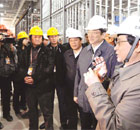Foreign and Military Affairs
Wen assures Europe on trade, investment options in China
By Ding Qingfen and Xin Zhiming (China Daily)
Updated: 2010-04-30 07:49
 |
Large Medium Small |
BEIJING - Premier Wen Jiabao said on Thursday that China was willing to send more trade delegations to Europe this year to increase imports from the continent while "unswervingly" continuing its opening up drive that will facilitate foreign investment in the world's largest market.
He made the comments during his meeting with visiting European Commission President Jose Manuel Barroso.
| ||||
Complaints have arisen recently from foreign companies, including European ones, about China's new, indigenous innovation rules and government procurement policies that they said favor domestic businesses while Chinese companies have long complained that the government has offered too many preferential policies for foreign firms in China.
Wen said that foreign companies will not be discriminated against in the Chinese market, while calling on European leaders to recognize China as a market economy.
China is due to implement new regulations on standards that some foreign technology firms and manufacturers fear will raise the costs of doing business in the country.
"I want to state that the Chinese government will unswervingly implement a policy of opening (up) to the outside world," said Wen. China would strive to give all businesses, Chinese and foreign, a "market environment of fair competition", he said.
"The policy of encouraging indigenous innovation treats all businesses in China the same. It will not exclude foreign companies."
Zhou Hong, director of the Institute of European Studies at the Chinese Academy of Social Sciences, said that foreign firms should adapt to routine changes in the developing Chinese market. "If enterprises cannot adapt themselves to the changes and challenges of this market, how can they keep pace with the world?" she said.
Zhou said it should be the businesses changing in accordance with the market rather than the other way round. "There will be both opportunities and challenges."
Wen also said that China is "actively and conscientiously preparing" to join the World Trade Organization's agreement on government procurement." Noting that the world economy still needs time to shake off the impact of the global financial crisis, Wen reiterated calls against protectionism and for a greater role for developing countries in international financial institutions.
"Although the impact of the international financial crisis is weakening and the global economy and trade are reviving, truly vanquishing this crisis will require countries to make constant efforts for some time yet," Wen said.
He added that this effort included "opposing all forms of trade protectionism".
China has made much headway in rebalancing its economy as the January-February trade figures show that its imports increased by 63.6 percent, 32.2 percentage points higher than exports, with the surplus decreasing 50.5 percent year-on-year.
Ai Yang and Reuters contributed to the story.











